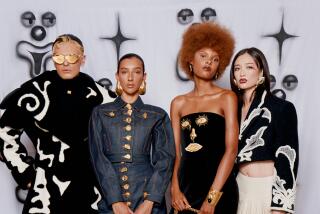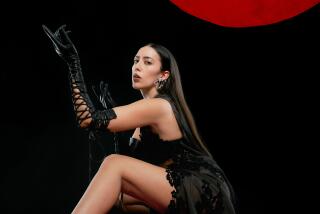‘In My Shoes’ kicks any who crossed Tamara Mellon
Tamara Mellon’s life combines the hallmarks of Greek tragedy, Dynasty-style soap opera and the modern fairy tale of a career woman who longed to have it all.
Few stones are left unturned in the autobiography of the creative visionary behind Jimmy Choo, a multimillion-dollar accessories powerhouse, which Mellon forged by encapsulating the sex, glamour and full-throttle potency of stiletto heels in accessible product lines for the 21st century luxury consumer.
It should be a great read — and it is, mostly, especially for readers more interested in gossipy tittle-tattle than the nitty-gritty of profit and loss. But it is also ultimately undermined by the author’s complaints about all those who did her wrong along the way. Which, it would seem, is everyone — with particular rancor directed at the private equity industry.
After years of supposed betrayals in the boardrooms and back rooms of her business, coupled with family feuds and an errant billionaire husband, Mellon turned on her heel and walked away from this sprawling, highly successful empire in 2011.
“In My Shoes: A Memoir,” published by Portfolio, candidly charts Mellon’s ascent yet rarely makes for happy reading. The early pages paint a picture of an unhappy childhood spent shuttling between Beverly Hills and a drafty British boarding school, before giving way to her cocaine-fueled 20s as a Vogue accessories editor and society party girl.
Only after a stint in rehab at 28 does Mellon recognize her true calling: to build a shoe brand. It is hard to imagine now, but in 1996 luxury footwear was barely a category. In this, Mellon saw opportunity.
Enlisting the services of Jimmy Choo, a Malaysian immigrant and east London cobbler — and taking a loan and “kitchen MBA” from her father, entrepreneur Tommy Yeardye — Mellon set about consolidating one of luxury’s highest-profile recent success stories.
Beloved by Hollywood A-listers, politicians and the jet-setting elite for its empowering “glamazon” aesthetic, Jimmy Choo Ltd. was worth nearly $900 billion by 2011. But an early decision to use outside investment to fuel expansion would dog Mellon for years: After an acrimonious fallout with Choo, three cycles of private equity ownership and a final investor buyout, Mellon finally cashed out of Jimmy Choo for an estimated $135 million.
Her rise to the heights of fashion and finance, and the lessons learned along the way, are often mesmerizing; so, too, are the grit and determination with which she has redefined herself and her business interests, culminating in an eponymous luxury-lifestyle label with items going on sale this month.
But for all her evident drive, talent and savvy, Mellon displays a childish streak in her venomous and personal attacks.
The kind of embittered insults she levels at her family feel both petty and unprofessional when directed publicly at colleagues, investors and even entire industries.
“The private equity mindset is just as delusional as my mother’s because, like hers, it insists on redefining the world to suit its pathology,” she snipes, undermining otherwise astute observations about the uneasy relationship between art and commerce.
Similarly, sweeping statements such as the aside that “private equity should stick with cement factories and soybeans and stay out of fashion” dilute her story.
As she sticks her pointy-toed boot into buyouts, Mellon should beware of extrapolating too much from her own unhappy experience. Owners, in whatever form, are rarely fairy godmothers; they are investors and always have agendas. Sometimes these will be in line with those of a founder, sometimes not.
Flashes of myopia and self-pity aside, however, this is a juicy and honest memoir from one of the most successful self-made British businesswomen of her generation.
Elizabeth Paton is the U.S.- based fashion and luxury correspondent for the Financial Times of London, in which this review first appeared.






